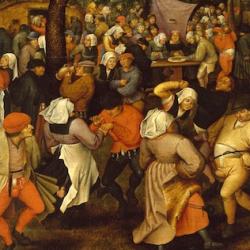For Thomas, the Torah was not simply another secular constitution. It was divine law, aimed at establishing not merely order or even justice but at encouraging charity. Thomas was echoing Jesus in his stress on the weightier things of the law – justice, mercy, truth.
As Matthew Levering (Christ’s Fulfillment of Torah and Temple, 115-6) notes, Thomas doesn’t leave this with generalities, but examines specific regulations of Torah: “The laws found in Deuteronomy and Leviticus regarding property and exchange . . . would not please proponents of business as usual, who look at things merely from the viewpoint of human law. . . What orchardist would like the idea that his neighbors could simply stroll in and eat their fill? As the objective goes on to point out, is this not tantamount to robbery? Likewise, does not the Jubilee year . . . put an impossible strain upon the principles of exchange? And what banker would ever loan anything without having access to something else as security?”
The point, Thomas argues, is that “the precept that permits people to eat from the produce of their neighbors does not encourage stealing but rather attempts ‘to accustom men to give of their own to others readily. . . . The same holds for the precepts that involve loans and exchange. In this case, the divine law tilts the balance in favor of those who are borrowers. Divine law does this not to punish lenders but to encourage the practice of being always ‘ready to come to one another’s assistance.’ The divine law reminds people that the purpose of lending is, fundamentally, to help others, not to make a profit off them.” Torah, in short, establishes “practices that promote the end of charity.”
True enough; but we should note another dimension to this. The owner of the orchard where others scrump isn’t deprived of his fruit; in fact, the law prohibits scrumpers from harvesting the whole field. The orchardist plants in order to enjoy the fruit of his planting, and to include others in that enjoyment. There is loss (he doesn’t get as much produce as he possibly could) but he’s not expected to impoverish himself to feed his neighbors.
Similarly with lending. Loans are not prohibited; I don’t think that Torah prohibits interest on all loans. And it would make sense if it leaves room for profitable loans. It has the same structure as the provision of scrumping: The lender gives money for another’s use, to help another start a business, say, and receives his money back with interest. His generosity in helping his neighbor comes back as increase for himself.
The structure that underlies this and other charity laws of the Torah is a Eucharistic structure. As John Milbank has said, the meal is the prime image of charity in Scripture – a meal in which the host doesn’t fast in order to watch his hungry guests eat, but the meal in which host and guests enjoy good things together.















